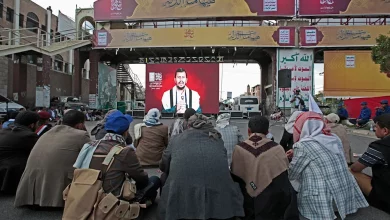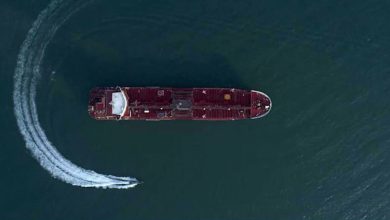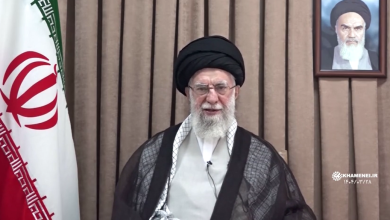Iran has braced itself to face any possible scenario, IRGC chief says
The chief commander of the Islamic Revolution Guards Corps (IRGC) has warned the United States against recent provocative moves in the Persian Gulf region, emphasizing that the Islam Republic stands fully prepared for any possible scenario.
Speaking at a ceremony marking the first anniversary of the assassination of top Iranian anti-terror commander Lieutenant General Qassem Soleimani and his companions in a US drone strike near Baghdad airport, Major General Hossein Salami highlighted that Pentagon’s recent decision to ramp up its military presence and activities in Persian Gulf and the Sea of Oman is because of the mistake it made last year with the Trump-authorized targeted killings.
Salami noted that the assassination of Lt. Gen. Soleimani, commander of the Quds Force of Iran’s Islamic Revolution Guards Corps (IRGC), and his Iraqi trenchmate Abu Mahdi al-Muhandis, deputy head of the Popular Mobilization Units (PMU), and their associates bred passionate hatred among Muslims worldwide.
“This intense hatred always haunts Americans like a nightmare. They have taken a series of actions to escape from this horrible nightmare. We have braced ourselves for any scenario,” he pointed out.
“Iran has no worries. We are ready to defend our independence, vital interests and achievements of our great [1979 Islamic] revolution as we have demonstrated over the past 41 years.
“Today, we have no problems, worries nor concerns to face any military power,” Major General Salami noted.
On Wednesday, two nuclear-capable American B-52 bombers flew over the Persian Gulf after nonstop flights to the region from their US-based hangars. It was the third time in six weeks that American bombers were conducting long-range flights off the Iranian coast.
The latest deployments came after the US Navy announced the arrival of a nuclear-powered submarine in the Persian Gulf last week. The USS Georgia passed the Strait of Hormuz accompanied by two American warships, making it the first missile-loaded submarine of its kind to enter the Persian Gulf in eight years.
The region has witnessed escalating tensions since Trump accused Iran of playing a role in the attacks on the US embassy in Iraq late last month, threatening retaliation.
‘Iraq should respond firmly to US assassinations of Soleimani, al-Muhandis’
Meanwhile, the leader of Asa’ib Ahl al-Haq anti-terror group, whose fellow fighters are part of the PMU – better known by the Arabic word Hashd al-Sha’abi, has called on the Baghdad government to give an appropriate response to the assassinations of Lt. Gen. Qassem Soleimani, PMU deputy chief, and their associates.
“I regret the procrastination in responding to the target killings of Gen. Soleimani and Abu Mahdi Al-Muhandis. Iraq’s response should have been stronger than Iran’s,” Qais al-Khazali said in an exclusive interview with Iraq’s Arabic-language al-Ahad television network on Thursday night.

Al-Khazali added, “As an Iraqi national, I am heartbroken not to have responded to the assassination of Martyr Abu Mahdi al-Muhandis. The United States should not harbor the delusion that the resistance [front’s] response to any aggression will not be befitting. The presence of any foreign military base on Iraqi soil is unlawful and against the Constitution, especially after the approval of the Iraqi parliament’s resolution.”
The leader of Asa’ib Ahl al-Haq group then called on the Iraqi Judiciary to prosecute those responsible for the assassinations before Trump ends his tenure on January 21.
Lieutenant General Soleimani and Muhandis were assassinated along with their companions in a US terror drone strike authorized by Trump near Baghdad International Airport on January 3.
Iraqi lawmakers approved a bill two days later, demanding the expulsion of all foreign military forces led by the United States from the Arab country.
Both commanders were admired by Muslim nations for eliminating the US-sponsored Daesh Takfiri terrorist group in the region, particularly in Iraq and Syria.
The US assassination drew a wave of condemnation from officials and movements throughout the world, and triggered huge public protests across the region.
Early on January 8, the IRGC targeted the US-run Ain al-Assad air base in Iraq’s western province of Anbar after launching a wave of attacks to retaliate the assassination of Lt. Gen. Soleimani.
According to the Pentagon, more than 100 American forces suffered “traumatic brain injuries” during the counterstrike on the base. The IRGC, however, says Washington uses the term to mask the number of the Americans who perished during the retaliation.
Iran has described the missile attack on Ain al-Assad air base as a “first slap.”
Head of the Iranian Judiciary’s High Council for Human Rights Ali Baqeri-Kani announced on December 28 that the country has identified and is prosecuting 48 individuals for masterminding and conducting Lt. Gen. Soleimani’s assassination.







